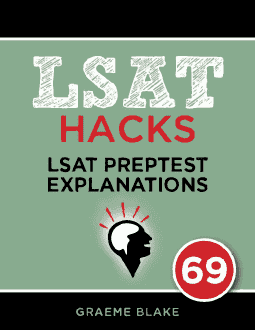QUESTION TEXT: If Skiff's book is published this year, Professor…
QUESTION TYPE: Sufficient Assumption
CONCLUSION: Skiff will be promoted if his book is as important and as well written as he claims.
REASONING: Published this year ➞ Recommendation ➞ Promotion
ANALYSIS: This is a trap question. It’s designed to catch people who have an incorrect, rigid view of logic.
We’re trying to reach “promotion”. And the conclusion is “important AND well written ➞ promotion”. You might think that you need both important and well written to join the conclusion to the evidence. But that’s not the case. We’re just trying to show that if the book has both those things, then Skiff will be promoted.
Answer A is correct because it makes the evidence chain look like this: Important ➞ published this year ➞ Recommendation ➞ Promotion
So if the book is important, Skiff will be promoted. In this chain, we only need “important”.
Lets look at the conclusion again. It says that if the book is important and well written, skiff is promoted. If the book is important and well written, is the book important? Yes. And that’s now the sufficient condition we need.
Three of the wrong answers add necessary conditions. Those never help you prove something will happen. They can only prove something won’t happen, when the necessary condition is missing.
___________
- CORRECT. See the explanation above.
- This doesn’t tell us Skiff will publish in time to get Nguyen’s recommendation. It just adds another useless necessary condition Skiff needs to fulfill before getting promoted.
- It doesn’t matter whether Nguyen thinks the book is well written. We already know Nguyen will recommend Skiff once he publishes.
- Same as B. This adds an additional necessary condition. That doesn’t help us prove that the book will be published this year.
- Same as B and D. This adds a necessary condition. That makes it harder for Skiff to get promoted.


11 years later, I am answering to Tom B. :). I am a student so I really appreciate this long thread. I understood my mistake. Thanks!! So this is what I got:
Tom B., You are correct that the stimulus does not say Important OR well written. The stimulus says Important AND well written. So far we agree.
Now, look at the answers stem: ” If we assume the following answer, can the conclusion be properly inferred”. Translation: If I assume the truth of SOMETHING NEW in the correct answer, not something in the stimulus (!), but absolutely new thing in the correct answer, ( SA), then the conclusion will be properly drawn/ true. OK. So look now at answer A. Is this something NEW. YES! It’s new. It’s saying only important can lead to published. Now, can I say that IF TRUE, that “new thing” will make my conclusion true? YES. Why? Because the stimulus INCLUDES my new thing in the conditional statement and it leads to a conclusion. Now I am saying, BTW, Important things can lead to publishing==> I add this in the stimulus as a true assumption, and I can see the conclusion is 100% proven. Similarly, if my new thing is ” well written” only, can I conclude that it’s enough to prove the conclusion? Yes! Why? Because my new thing( well written) is included in the stimulus as a conditional. I don’t have to follow the stimulus’s rule. I am doing my own rule and it fits. I only have to follow the answer choice that is required to be sufficient. I hope this helps :)